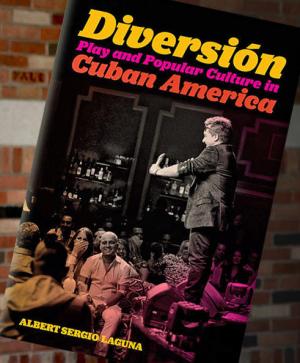Yale scholar examines Cuban-American life through lens of popular culture
There was a time when Albert Laguna thought his father was the funniest man in the world. Until, that is, he began to research the topic of popular culture in Cuba for his recently published book and realized that his father had been stealing quite a few of his jokes from the popular Cuban comedian Guillermo Alvarez Guedes.
Famous for his one-liners, Alvarez Guedes released over 32 joke albums, and made appearances on television, in movies and on radio. Despite the fact that the comedian has permeated Cuban American culture, “no one has ever written about his social importance and the consequences of his work,” says Laguna, adding that it the first thing he thought of when reading scholarship on Cuban Americans. “Cuban American studies has mostly focused on the pain of exile, but then you have this comedian who is the soundtrack for the quotidian life of so many. Everyone knows him. Cubans grows up listening to his albums at home, and people — including my own father — retell his jokes constantly.”
It was this comedian, and the topic of comedy and popular culture in Cuban America more broadly, that became the cornerstone for Laguna’s recently published book, “Diversión: Play and Popular Culture in Cuban America.”

Laguna, assistant professor of American Studies and Ethnicity, Race & Migration, used the stand-up comedy of Alvarez Guedes and other forms of comic popular culture to weave a story about the cultural, political, and even economic complexity of Cuban life in the United States. “It is also through humor that you can understand racial tensions in Miami between Cubans and African Americans, discrimination faced by Cuban Americans, and ties between Cubans on and off the island,” says Laguna. “Comedy is a complex site for understanding a range of social relations.”
This book, says Laguna, “asks the reader to slow down and think about the quotidian cultural consumption that frames their lives but that they don’t necessarily think about.” In a chapter about the internet, Laguna uses viral videos and memes to tell a story about generational tensions within the Cuban community as well as about connections between the island and the United States. “These very simple cultural moments that we take for granted actually can be unpacked to do important historical, social, and cultural work,” he notes.
Laguna, who teaches a course titled “History and Culture of Cuba” as well as courses in race and ethnic studies, explains that the study of popular culture can play an important role in enhancing a student’s education.
“When we step into a humanities classroom often there is a text deemed worthy of attention — a novel, or a poem, for example,” says Laguna. “The things we interact with on a daily basis are worthy of the same kind of critical attention and analytical skills that you would extend to a novel. All of the tools you would bring as a student of the humanities to a novel or a poem can be brought to popular culture to understand our present in deeper, more complex ways.” He adds: “Popular culture is always about the present. When I teach about popular culture it is a way to get our finger on the pulse of a moment.”
This year, for the second time, Laguna will take the students in his “History and Culture of Cuba” on a trip to Cuba for two weeks during spring break. Laguna co-teaches the class with Reinaldo Funes-Monzote, a professor from the University of Havana who is in residence at Yale. The students’ trip is funded entirely by the Council on Latin American and Iberian Studies at the MacMillan Center for International and Area Studies as part of its Cuba Initiative. It is “a gratifying teaching experience,” says Laguna.
According to Laguna, when the students returned to the United States after their trip last year they all agreed on one thing: Their initial ideas for understanding Cuba had been completely scrambled, and their visit complicated their ideas of what Cuba is. “That is exactly what I wanted,” he says. “The simple shorthands that circulate about Cuba as an evil place, or alternately that it is the greatest place in the world, are woefully inadequate. Once you take the class with us for 13 weeks and then visit Cuba you realize that those kind of quick sound bites just don’t do Cuba justice.”
Laguna says he is always astounded by the durability of Cuba in the American popular imagination. On the first day of class he asks his students: “When you think of Cuba, what comes to mind?” His students will “spout out” words like music, food, government. “Everyone in the room participates,” he says. “This is why this class is such a wonderful opportunity to understand not only the island but the long relationship between the United States and Cuba and how that has affected history in both places in ways that are often misunderstood.”
Written by Bess Connolly Martell for YaleNews.